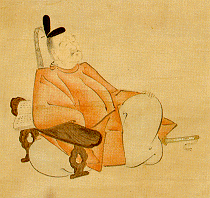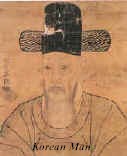Tanka is a short form of Japanese poetry. It is a mood poem written in five lines that incorporates natural images and human emotions. It is traditionally written in 31 syllables of 5,7,5,7,7. Modern writing of tanka varies in both syllables per line and number of lines. Tanka don't usually have titles but they are used on this page to differentiate between poems.
Classical Tanka-
The English translation of Ogura Hyakunin Isshu
from Hyakunin-Isshu
Sanjo-no-In
If, against my wish,
In the world of sorrows still,
I for long should live;--
How then I would pine, alas!
For this moon of middle-night.
Tenchi Tenno
Coarse the rush-mat roof
Sheltering the harvest-hut
Of the autumn rice-field;--
And my sleeves are growing wet
With the moisture dripping through.
Saigyo Hoshi
Is it then the moon
That has made me sad, as though
It had bade me grieve?
Lifting up my troubled face,--
Ah! the tears, the (mournful) tears!
Jozammi Karyu
Lo! at Nara's brook
Evening comes, and rustling winds
Stir the oak-trees' leave;--
Not a sign of summer left
But the sacred bathing there.
Awards 1st World Tanka Competition
English division: Third prize: Neca Stoller (Georgia, USA) There is a sadness when after days of turning through fields of flowers that seem endless, suddenly the stream reaches the ocean. James Kirkup, Judge-Remarks. It is a lovely thought, well-expressed. My only criticism is of the word "turning" which I would prefer to be "winding". The expression of the logical poetic thought is well balanced through all five lines.
TANKA SPLENDOR AWARDS 2000
Neca Stoller
He stands at the front door hesitating- each way an arrival.
| reflection pond it too has waves in the night wind and tides rising with the full moon |
yellow leaves dropping this morning drought turns summer into a wrinkled face also arriving too soon |
| cloudless evening another sunset shimmers in the August heat on the grass beside the stream a trace of you lingers |
like a casket like stones on a path as heavy as the scuff, scuff of hobbling-- the steps of a cancer patient |
| so still, the lilies gathered in clusters with great soft blossoms they break into two branches the current of the fresh stream Back to Contents |
When he was born unseen chrysanthemums. unseen when he dies The same cold scent. |
Sedoka is a very old form. Originally, It has 6 lines, totaling in 38 syllables in the following from: 5,7,7,5,7,7. The one below has 2 twists, one after second line, the second after the 4th line.
"The Blind" Shotguns flared like massing stars the noise, the smoke and through it all young Killingsworth sat crying. Back to Contents
Sijo
Sijo is Korean Poetry. Sijo is written in 44-46 syllables on either three or six lines. There should be a shift in content between the second and third lines. Unlike haiku, various poetic devices, such as metaphors and similes are accepted. Sijo is not normally titled.
The spring breeze melted snow on the hills then quickly disappeared.
I wish I could borrow it briefly to blow over my hair
And melt away the aging frost forming now about my ears.
...U T'ak (1262-1342, author of this oldest surviving sijo)
My body, in its withering, may become a lovely swallow.
Under the eaves of my loved one's home I'll build my nest of twigs.
After dusk I'll fly aloft and glide gently to his side.
. . . Anonymous
Mind, I have a question for you - How is it you stay so young?
As the years pile up on my body, you too should grow old.
Oh, if I followed your lead, Mind, I would be run out of town.
... Anonymous
A drum beats in the far temple; I think it's in the clouds.
Is it above the meadow and hill, perhaps below the sky?
Something sends a veil of mist, I cannot heed the drum.
... Anonymous
Oh that I might capture the essence of this deep midwinter night
And fold it softly into the waft of a spring-moon quilt
Then fondly uncoil it the night my beloved returns.
...Hwang Chin-i (1522-1565)
most revered female Korean classical poet
You ask how many friends I have? Water and stone, bamboo and pine.
The moon rising over the eastern hill is a joyful comrade.
Besides these five companions, what other pleasure should I ask?
...Yon Son-do (1587-1671)
Last week a friend died, this week another. Is it like learning to daydream, when each cloud fills more of your mind until you taste the shape of Georgia clay and go earthward down a spiral road?
That dark feather which guided the trusting bird on his last flight, Now drifts in the waning wind, slowly settling on the current, To lead the poor, unsuspecting creek into the new dam.
Down around my bare toes, those ants move with such grand elan, Utterly determined, never doubting their choice of direction, While high above I dwell on my mountain of indecision.
Coming to a gladiola, where the briars flourish; Pink and yellow blossoms profusely traverse a trembling stalk To open imprecisely on hard clay, yet thrive, much like myself.
I pick my way through weeds and thorns that entangle the empty land. Silhouetted in the hazy twilight, a tall, stone chimney. Standing alone, I still wonder- Do you remember me?
The Illusion
The Sunday newspaper swung and blew as I stooped to read of a woman "who looked lovely in a dress of black velvet with an illusion top." With smothered sounds like wet laundry in the wind, the paper broke away, slanting in devious and hidden turns, as if an augury, over new puddles and me running after it. My corduroy coat spiraled, then clung, soft as an evening dress, beguiling and forward, to swirl about my thighs in gorgeous disintegration. I danced down the street's polished verse, one complete waltz after another, to ring in the last year of the 1900's. Hello to the mud-covered future, or whatever illusion the new year chooses to wear.
first day of the year the joy of illusion becomes a dance down the street in the arms of the wind- carpe diem
Sunrise Dirt, rocks, clay, the whole earth curves to the half-lit sky. A buzzard, weightless, rises on the updraft alone like a girl among strangers. Stars wash out as warmth colors the fields. My eyes follow blooms slipping off my shoe while I pause to breathe. The path turns quietly hillside. Without my arrangement, the earth curves and turns, and myself with it. Vines bend with dew fill to brim, yet don't spill they turn and frame the light of the contained sky.
- Ogura Hyakunin Isshu
- Korean Books at Berkeley
- Sijo Forum Mailing List
- Sijo Blossoms
- Larry's Gross Sijo Wordshop
- Guide to Japan
Markets
- American Tanka
- Tundra, Michael Dylan Welch, Editor, 248 Beach Park Boulevard, Foster City, CA 94404
- Magazine List




